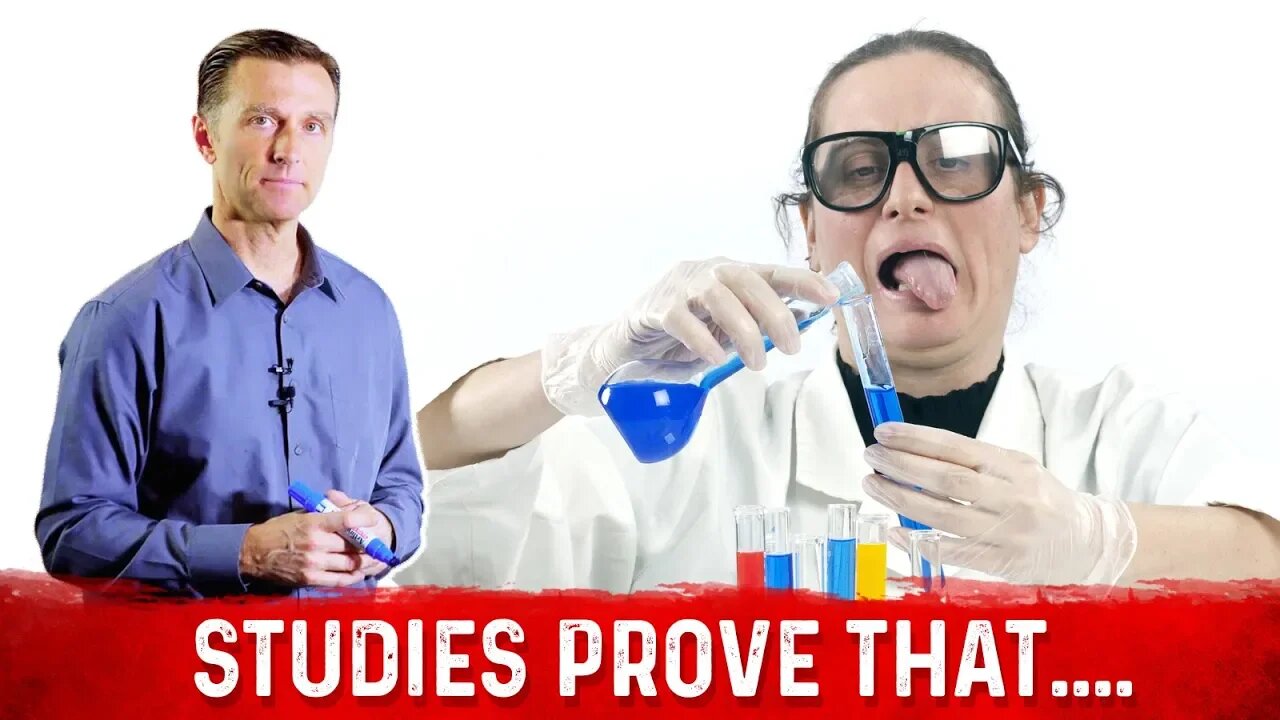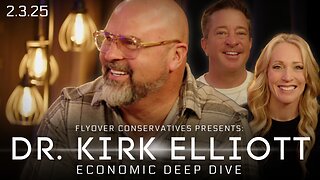Premium Only Content

Pharmaceuticals Industry - It's "Backed By Science" TRUST US! – Dr.Berg
When something is billed as being backed by science, does that mean it’s trustworthy?
Timestamps:
0:00 If something is backed by science does that mean it’s trustworthy?
0:40 These are some of the drugs deemed safe but found to be dangerous
1:41 The main question to ask is, who is funding the study?
You may hear about something that’s reported to be backed by science. Or you may hear that the science is settled so we don’t need to keep examining (whatever it is) because we’ve done enough research. Like fats were bad but now they’re good. Or trans fats were okay but now they’re not.
Or certain drugs were called safe and effective but years later taken off the market.
I put a link below of 176 drugs that were considered safe and effective but are now off the market because they were found to be dangerous. They include:
●Accutane, which can cause liver damage
●DES
●Thalidomide
●Cylert for ADD and ADHD
●Permax
●PTZ
●Metrazol
I’d like to know how long these drugs were studied to determine if they were safe. But the main question to ask is, who is funding the study?
Sometimes it’s governments giving grants to universities. Others it’s the industry that funds universities. Then you have a few non-profits doing research.
Before 1970 the majority of research was done and paid for by the government. But now between 71 and 85 percent of research is done by industry. A lot of times the industry will partner with the government for research and development (R&D). You’re paying for it with your taxes.
Then drug companies mark up their products by a thousand percent, making massive amounts of profit. For example, one drug to treat Hepatitis C costs $84,000 for three months in the US. But in India, it’s only $500.
You and I get stuck with the bill for research. Then we allow the industry to pay certain people to sit on boards and committees that regulate guidelines in our health care. Of course not to mention medical journals which depend on industry money for their advertising.
But the worst is when the industry cherry-picks data but doesn’t have to publish the studies they rely on. JAMA, a medical journal, found that when industry funds study the results come out three to five times more positive for that industry.
Unfortunately what we’re missing in science is ethics.
Now you understand why when something is backed by science that you can’t always trust it.
Talk to a Product Advisor to find the best product for you!
Call 1-540-299-1556 with your questions about Dr. Berg's products. Product Advisors are available Monday through Friday 8am-6pm and Saturday 9am-5pm EST.
* At this time, we no longer offer Keto Consulting and our Product Advisors will only be advising on which product is best for you and advise on how to take them.
Dr. Eric Berg DC Bio:
Dr. Berg, age 56, is a chiropractor who specializes in Healthy Ketosis & Intermittent Fasting. He is the author of the best-selling book The Healthy Keto Plan, and is the Director of Dr. Berg Nutritionals. He no longer practices, but focuses on health education through social media.
Follow Me On Social Media:
Facebook: https://bit.ly/FB-DrBerg
Instagram: https://bit.ly/IG-DrBerg
Anchor: https://bit.ly/Anchor-DrBerg
TikTok: https://bit.ly/TikTok-DrBerg
Send a Message to his team: https://m.me/DrEricBerg
ABOUT DR. BERG: https://www.drberg.com/dr-eric-berg/bio
Disclaimer:
Dr. Eric Berg received his Doctor of Chiropractic degree from Palmer College of Chiropractic in 1988. His use of “doctor” or “Dr.” in relation to himself solely refers to that degree. Dr. Berg is a licensed chiropractor in Virginia, California, and Louisiana, but he no longer practices chiropractic in any state and does not see patients so he can focus on educating people as a full time activity, yet he maintains an active license. This video is for general informational purposes only. It should not be used to self-diagnose and it is not a substitute for a medical exam, cure, treatment, diagnosis, and prescription or recommendation. It does not create a doctor-patient relationship between Dr. Berg and you. You should not make any change in your health regimen or diet before first consulting a physician and obtaining a medical exam, diagnosis, and recommendation. Always seek the advice of a physician or other qualified health provider with any questions you may have regarding a medical condition.
Thanks for watching!
-
 5:57
5:57
Dr. Eric Berg
3 days agoDiscover the MOST Toxic Ingredients You Should NEVER Eat
5.43K36 -
 5:30:06
5:30:06
SpartakusLIVE
9 hours ago#1 King of Content kicks off YOUR week with Monday MOTIVATION
60.7K4 -
 5:56:52
5:56:52
Akademiks
7 hours agoKendrick Lamar Sweeps Grammys. Drake announces new album on Feb 14. Rocky Trial Might get Dismissed?
59.2K4 -
 3:25:02
3:25:02
BrancoFXDC
5 hours ago $1.47 earnedWarzone Rebirth Rounds
21.9K -
 1:44:14
1:44:14
Glenn Greenwald
11 hours agoRubio's Shift: What is Trump's Foreign Policy? Trump/Musk Attack CIA Fronts USAID & NED: With Mike Benz | SYSTEM UPDATE #401
84.7K81 -
 1:05:47
1:05:47
Donald Trump Jr.
13 hours agoMexico Sends Troops to Border, Plus USAid Scam Exposed, Live with Brooke Goldstein & Rep Brian Mast | TRIGGERED Ep.213
233K291 -
 9:26
9:26
Rethinking the Dollar
9 hours agoUnbelievable Government Waste: 5 Outrageous Biden-Era Spending Sprees
64.9K16 -
 2:37:43
2:37:43
Flyover Conservatives
1 day agoDR. KIRK ELLIOTT | Deep Dive: Tariffs, Tech, and Total Economic Warfare – Who Wins and Who Loses? | In Studio - FOC Show
61.4K4 -
 3:12:37
3:12:37
Danny Polishchuk
11 hours agoTariffs and Trade Wars + Nick Rochefort | Low Value Mail #136
44.5K3 -
 2:04:40
2:04:40
I_Came_With_Fire_Podcast
13 hours agoCartels vs The United States, Fentanyls 2 Front WAR, and FTOs
23.9K